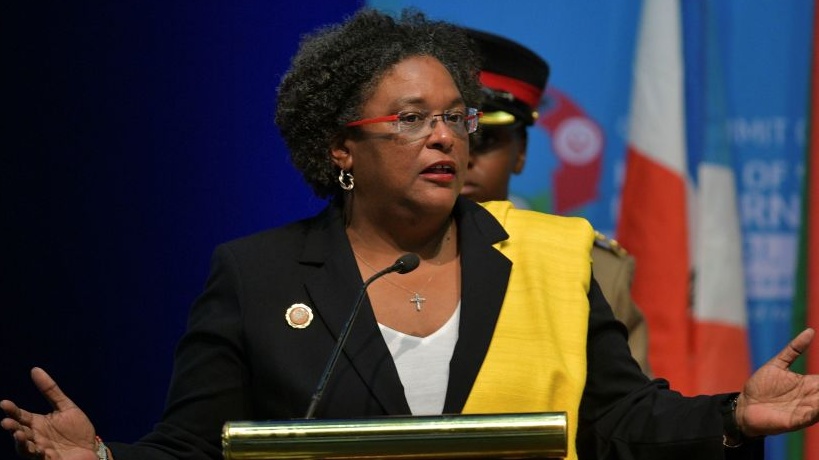Mia Mottley, the Prime Minister of Barbados, was forced to shoot down a series of offensive questions about the LGBTQ+ community during an interview with BBC journalist Christian Fraser on Monday.
As Blavity previously reported, the nation recently removed Queen Elizabeth II as its head of state and become a republic as many other Caribbean nations, like Trinidad and Tobago, Dominica and Guyana, have done in recent years. Mottley appeared on the program to discuss the country's recent decision.
Fraser, visibly upset by the move, was seemingly intent on pressing Mottley about her government's decision last week to officially recognize same-sex civil unions and proceeded to act as if homosexuality in and of itself was up for a referendum.
“For that next generation, should they be allowed to be gay in Barbados?” Fraser asked Mottley.
She asked him to repeat the questions because she did not understand it.
“Should people in Barbados be allowed to be gay, to be homosexual?” he said again.
With a confused look, she asked him whether he would ever ask that kind of question to other national leaders.
“Is that a question you would ask the United Kingdom?” Mottley asked.
Fraser then implied that the United Kingdom was more progressive because the country had legalized gay marriage while Barbados has mulled over it, completely ignoring the fact that the ban on gay marriage in Barbados was put in place and enforced by the British Empire for hundreds of years per CNN.
“I think that is a most inappropriate question as to whether a person should be ‘allowed’ to be gay. I think the question is, should we discriminate against people because they’re gay? And we will not," Mottley told Fraser.
"We are absolutely clear that Barbados became the first Black slave society, and a country that has known what it is to discriminate against citizens for centuries cannot in today’s world be discriminating against any human being for any reason whatsoever,” she added.
She went on to explain that the government can control civil unions and has made efforts to ensure equality for all LGBTQ+ people, but that "marriage" is controlled by the church, so they had to put it under a vote.
“The government is resolute that marriage is a function of the church, and to that extent, a referendum will be held to allow all parties to determine whether they will speak on marriage or not," she said.
"With respect to civil unions, we believe that that is a function of civil rights, and to that extent there shall be no discrimination against any person, whether gay, whether straight, whether Black, whether white, whether short, whether tall, for any reason in this country,” she explained.
Last week in parliament, Barbados governor general Dame Sandra Mason said the country is ready to recognize civil unions for same-sex couples "to ensure that no human being in Barbados will be discriminated against, in exercise of civil rights that ought to be theirs.”
“The settlement of Barbados was birthed and fostered in discrimination, but the time has come for us to end discrimination in all forms," Mason said last Tuesday, according to NationNews. "I wish to emphasize that my government is not allowing any form of same-sex marriage, and will put this matter to a public referendum."
The entire interview was contentious even after Mottley tried to show respect for the British monarchy and explain why the country believed it needed to remove Queen Elizabeth as head of state.
The move from a monarchy system to a republican system has gained steam in recent years due to the Black Lives Matter movement and a series of scandals in the United Kingdom involving its efforts to unfairly deport people who came there from Caribbean nations decades ago.
The British Queen's reign over Barbados will officially end in November 2021, according to The Guardian. Guy Hewitt, who served as Barbados high commissioner to the United Kingdom from 2014 to 2018, said the move has been in the works for some time.
"The Windrush scandal and the Black Lives Matter movement have altered perceptions of the colonial 'mother country.' Theresa May’s ill-conceived and xenophobic immigration policy 'to create a really hostile environment for illegal immigrants' violated the rights of many elderly, West Indian-born, long-time UK residents. The less fortunate got detained, and some were deported," Hewitt wrote for The Guardian.
"The continuing bias against these West Indians was further reflected by the fact that, in recent years, they were not treated as anomalies to be regularized but instead as 'illegal immigrants,'" he added.
Barbados achieved independence from the United Kingdom in 1966 but kept the British monarchs as head of state. Antigua and Barbuda, the Bahamas, Barbados, Belize, Grenada Jamaica, St. Lucia, St. Kitts and Nevis, St. Vincent and the Grenadines still have Queen Elizabeth as head of state but The Guardian reported that many may try to also move to republican system when she passes away and her son becomes king.
